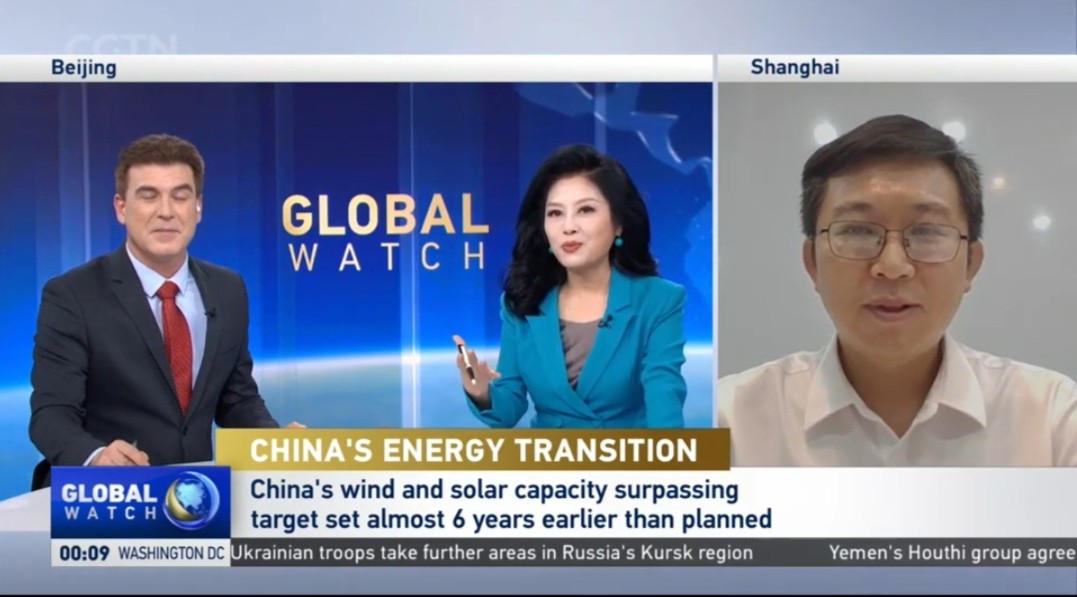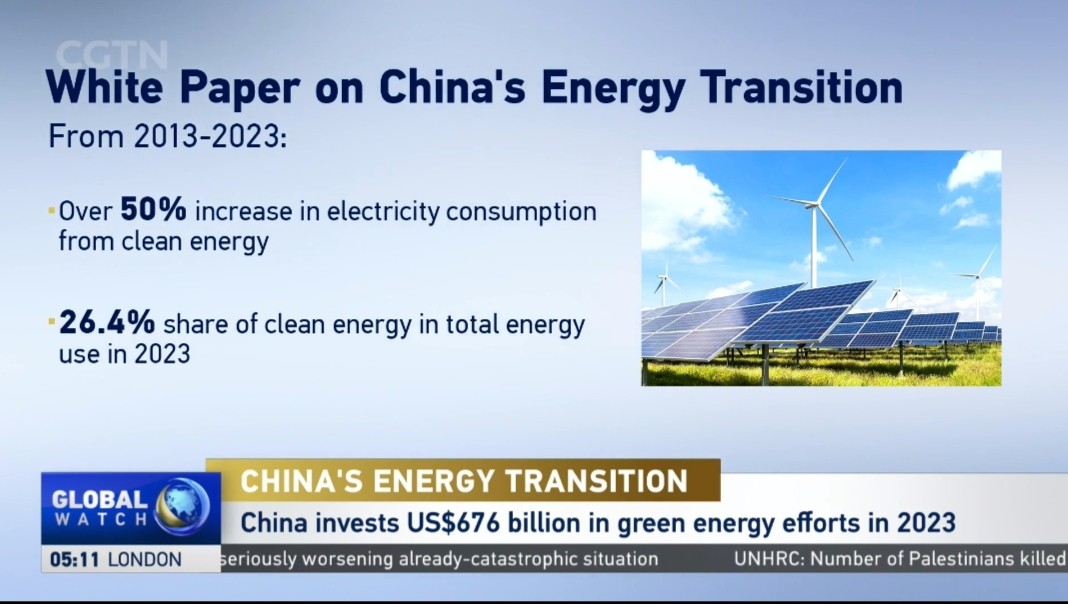尹海涛教授解析中国可再生能源发展新格局 发布时间:2024-08-30

近日,tyc1286太阳成集团经济管理学院教授尹海涛做客CGTN"全球观察"栏目,深入剖析了中国可再生能源领域的最新发展态势。
尹海涛教授指出,中国在可再生能源方面的发展速度令人瞩目。并以宁德时代为例,展示了中国企业在推动可再生能源技术进步方面的积极作为。尹海涛表示,中国不仅提前6年完成2030年风电和光伏装机目标,更在2023年向能源转型领域投入高达6760亿美元。这一成就体现了中国对2060年碳中和承诺的坚定决心,同时也彰显了可再生能源产业的巨大经济潜力。

以下是双语采访原文:
Here is the bilingual transcript of the interview:
CGTN: For some analysis into China's transition to new energy, Professor YIN Haitao of Business, Economics and Public Policy is joining us. Professor Yin is also the Vice Dean of the Antai College of Economics and Management at Shanghai Jiao Tong University. Professor, welcome to Global Watch. China, as we just heard, has another benchmark. Wind and solar capacity have surpassed a target almost six earlier than planned. How does this reflect on China's green transition efforts?
CGTN: 为了深入分析中国向新能源转型的情况,我们邀请到了tyc1286太阳成集团的尹海涛教授。尹教授同时担任商业、经济与公共政策系教授和学院副院长。尹教授,欢迎您做客CGTN《全球观察》栏目。近来我们得知,中国又创造了一个新的里程碑。风能和太阳能发电装机容量比原定计划提前近6年实现目标。这一成就如何体现了中国在绿色转型方面所做的努力?
Prof. YIN: China's transition to renewable energy is driven by China's firm commitment to carbon neutrality. As we all know, we are going to achieve carbon neutrality by 2060, according to a report from International Energy Agency. In order to achieve carbon neutrality, China needs to shift its electricity generation from almost 70 percent from fossil fuels to 70 percent from renewable energy. And we have to finish this in only 40 years. It's not easy. Clearly, we did a pretty good job. In the last few years, renewable energy is booming in China, reaching 1.2 billion kilowatts. This number was a goal we set up in 2020 for the year of 2030. We achieved this goal six years ahead of time. This evidence is that industry sectors have a consensus in carbon neutrality, and at the same time, the industrial sectors also see the transition to renewable energy as a big economic opportunity.
尹海涛: 中国积极推进可再生能源转型,这源于我们对实现碳中和的坚定承诺。众所周知,根据国际能源署的报告,我们的目标是在2060年实现碳中和。要达成这一目标,中国需要在40年内将发电结构从目前以化石燃料为主(约70%)转变为以可再生能源为主(70%)。这无疑是一项艰巨的任务。然而,我们的表现相当出色。近年来,中国的可再生能源发展势头强劲,装机容量已经突破12亿千瓦。这一数字原本是我们在2020年为2030年设定的目标,没想到提前6年就实现了。这充分说明,产业界已经就碳中和达成共识,同时也将向可再生能源转型视为一个巨大的经济机遇。
CGTN: The White Paper says that China's investment in energy transition reached 676 billion US dollars in 2023. That makes it the world's highest investor in this field. So how could these investments have been allocated, and what's their significance? Because you can go a lot of different ways. You can go for wind, you can go for geothermal, you can go for hydroelectric. Where do you go?
CGTN: 根据白皮书显示,2023年中国在能源转型方面的投资高达6760亿美元,成为全球该领域的投资冠军。那么,这些投资是如何分配的?它们有什么重要意义?毕竟投资方向有很多选择,比如风电、地热、水电等,究竟应该重点投向哪些领域呢?
Prof. YIN: Yes. Of course, we spend money on renewable power plants, as you mentioned, the wind, solar, geothermal. But I'm going to emphasize the investment on technological innovation is unprecedented. For instance, CATL, the leading battery company, spent about 70 billion Chinese yuan on innovation in the last 10 years. It has this investment that ensures China's technological advancement in renewable energy. Because we are leading in technology, the export of renewable products is also booming. Electrical vehicles, lithium battery and solar panel, these three products, we put them together, the export reached 1,000 billion Chinese yuan last year. We are proud of this.
尹海涛: 没错,我们当然需要投资建设各类可再生能源电站,比如您提到的风电、太阳能、地热等。但我想特别强调的是,我们在技术创新方面的投入是前所未有的。以领先的电池企业宁德时代为例,他们在过去10年里在创新上的投入就高达700亿元人民币。正是这些大规模投资,才确保了中国在可再生能源技术领域始终保持领先地位。得益于我们的技术优势,可再生能源产品的出口也蒸蒸日上。去年,仅电动汽车、锂电池和太阳能电池板这三种产品的出口额就突破了1万亿元人民币。这一成就令我们倍感自豪。
CGTN: Professor, although its use is declining, fossil fuels, we have to talk about this, are still in the country's energy mix, coupled with politicizing climate change and escalating trade barriers such as tariffs on electric vehicles. What are the main challenges to see ahead for China?
CGTN: 尹教授,尽管化石燃料的使用在逐步减少,但它们目前仍是中国能源结构中不可或缺的一部分。再加上气候变化问题的政治化,以及不断升级的贸易壁垒,比如对电动汽车征收关税等,您认为中国未来在这方面将面临哪些主要挑战?
Prof. YIN: Yes, I think we have two key challenges. Internationally, as you said, we see that trade barriers for China's renewable products, renewable technology, are increasing. Domestically, we must make sure that the large amount of electricity that we generated from renewable energy can be smoothly fed into the grid. For this innovation, both technological innovation and operational innovation, I think, is critically important. Thank you!
尹海涛: 是的,我认为我们面临两大关键挑战。在国际层面,正如您所说,中国的可再生能源产品和技术正面临着日益增多的贸易壁垒。在国内层面,我们必须确保从可再生能源中产生的大量电力能够顺利并入电网。要实现这一目标,我认为技术创新和运营创新都至关重要。谢谢!
Source:
https://www.cgtn.com/tv/replay?id=BfEIaIA
About Professor YIN Haitao

尹海涛教授,于宾夕法尼亚大学沃顿商学院获得博士学位,曾在密歇根大学等知名学府任教。他的研究主要聚焦于环境与能源经济学及政策。尹海涛主持过多项重要研究项目,在顶级学术期刊发表论文,并获得国家优秀青年科学基金等多项荣誉。
随着中国不断推进绿色能源目标,尹海涛的见解为政策制定者、业界领袖和学术界提供了宝贵的参考。


